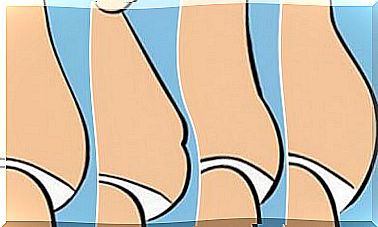7 Habits That Cause Gastroesophageal Reflux
Not spending enough time to chew food well can lead to acid reflux. Although many overlook it, this is the first step to an optimal digestive process.

There are several habits that cause or may cause gastroesophageal reflux. This is a digestive problem that develops when stomach acid backs up into the esophagus and mouth, causing irritation.
It usually occurs after eating too copious dishes, but it also appears due to certain diseases. Its main symptom is a burning sensation in the chest, which is often accompanied by chest pain and swallowing problems.
In some people it occurs sporadically, while others suffer it moderately or severely, several times a week. The consumption of antacids can control it. However, in general, it is essential to know its causes in order to combat it effectively.
Therefore, below we want to review in detail its symptoms and some habits related to its appearance.
Gastroesophageal reflux symptoms
The clinical manifestations of gastroesophageal reflux can vary in each person, depending on its cause. It is often described as a burning at the level of the breastbone and the sensation of having a lump in the throat. However, it is also possible to experiment:
- Increased salivation
- Spitting up sour food or liquids.
- Chronic cough.
- Trouble breathing
- Snoring and sleep problems.
- Abdominal swelling and belching.
Habits that can cause gastroesophageal reflux
The development of gastroesophageal reflux implies an imbalance between the aggressive and defensive factors of the esophageal mucosa. In addition, it indicates a weakening of the sphincters that regulate the passage of acidic juices.
The following habits cause gastroesophageal reflux, or rather, are its possible triggers:
1. Eat irritating foods

The composition of some foods or their bad combination in the same dish can be the cause of episodes with this problem. Well, these produce an alteration in the production of acidic juices in the stomach, weakening the mucous membranes.
The most common are the following:
- Refined flours.
- Stuffed meats.
- Fried foods and packaged snacks.
- Spicy seasonings.
- Industrial bread and pastries.
- Canned food
- Dressings and sauces.
- Cured cheeses.
- Coffee and caffeinated products.
2. Smoking
Daily cigarette smoking is one of the factors or habits that cause gastroesophageal reflux. First, the toxins in tobacco disrupt saliva production. This helps neutralize the action of acids to prevent heartburn. Therefore, this process is hampered.
On the other hand, it causes dehydration in the mouth and throat. In turn, this facilitates irritation in the presence of acids. Thus, to control this problem it is essential to stop smoking.
3. Wear tight clothing
Although many ignore it, wearing clothes that are too tight influences the recurrence of this symptom. Clothing such as pants, belts, or T-shirts can increase intra-abdominal pressure. This can promote the discharge of acid content into the esophagus.
4. Adopting bad posture
Eating lying down or adopting a bad position after eating are factors related to reflux. This increases abdominal contractions and facilitates the return of acidic juices to the upper body.
5. Not chewing well
One of the main recommendations to avoid gastroesophageal reflux is to chew your food well before swallowing it. While it is easy to overlook, it is the first step to an optimal digestion process.
Eating very whole foods wastes important enzymes and slows down stomach functions. As a consequence, the secretion of acidic juices increases and, therefore, heartburn.
6. Consume alcohol

Another habit that causes gastroesophageal reflux is undoubtedly consuming alcohol. Well, the harmful compounds in alcoholic beverages overload the work of the liver and slow down the digestive process.
On the other hand, they block the function of the unidirectional valve that is responsible for preventing the ascent of gastric contents towards the esophagus.
For this reason, drinking alcohol excessively makes reflux worse and causes irritation to the stomach lining. Symptoms may be worse if there is a history of gastritis or ulcers.
7. Being exposed to stress
People who are constantly exposed to stressful situations have a more difficult time controlling gastroesophageal reflux attacks. This emotional state triggers reactions in the nervous system that alter several of the processes that take place in the digestive tract.
It also increases the secretion of stimulant substances such as adrenaline. This, in turn, is linked to an increase in the production of acidic juices.
Beware of these symptoms!
Have you just identified any of these habits that cause gastroesophageal reflux in yourself? Try to avoid them now to facilitate the relief of this problem. If it still persists, see your doctor to determine if it is due to a more careful condition.









